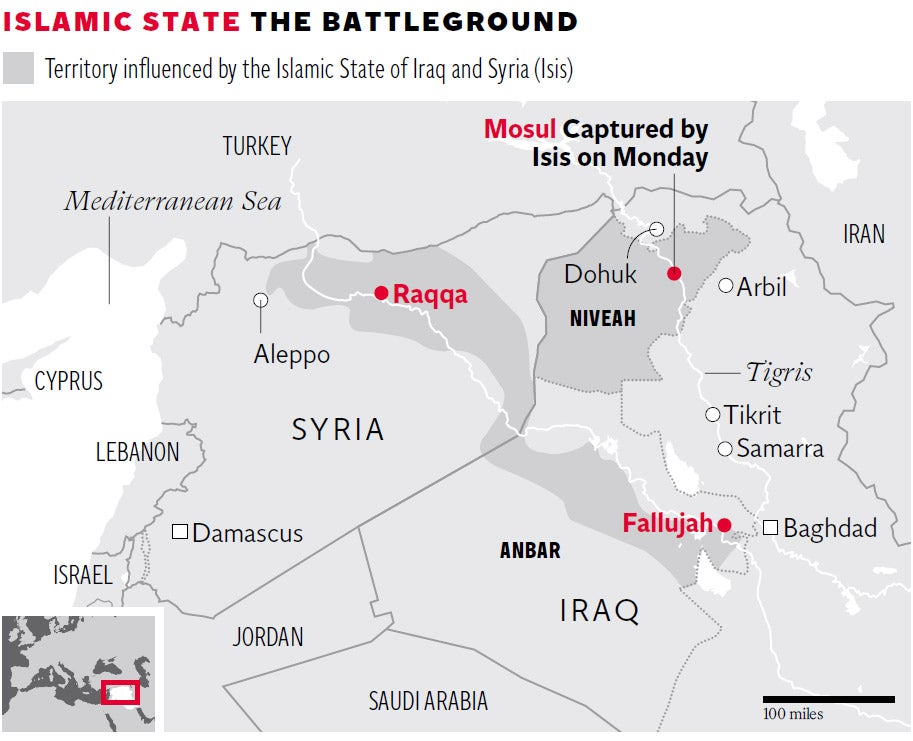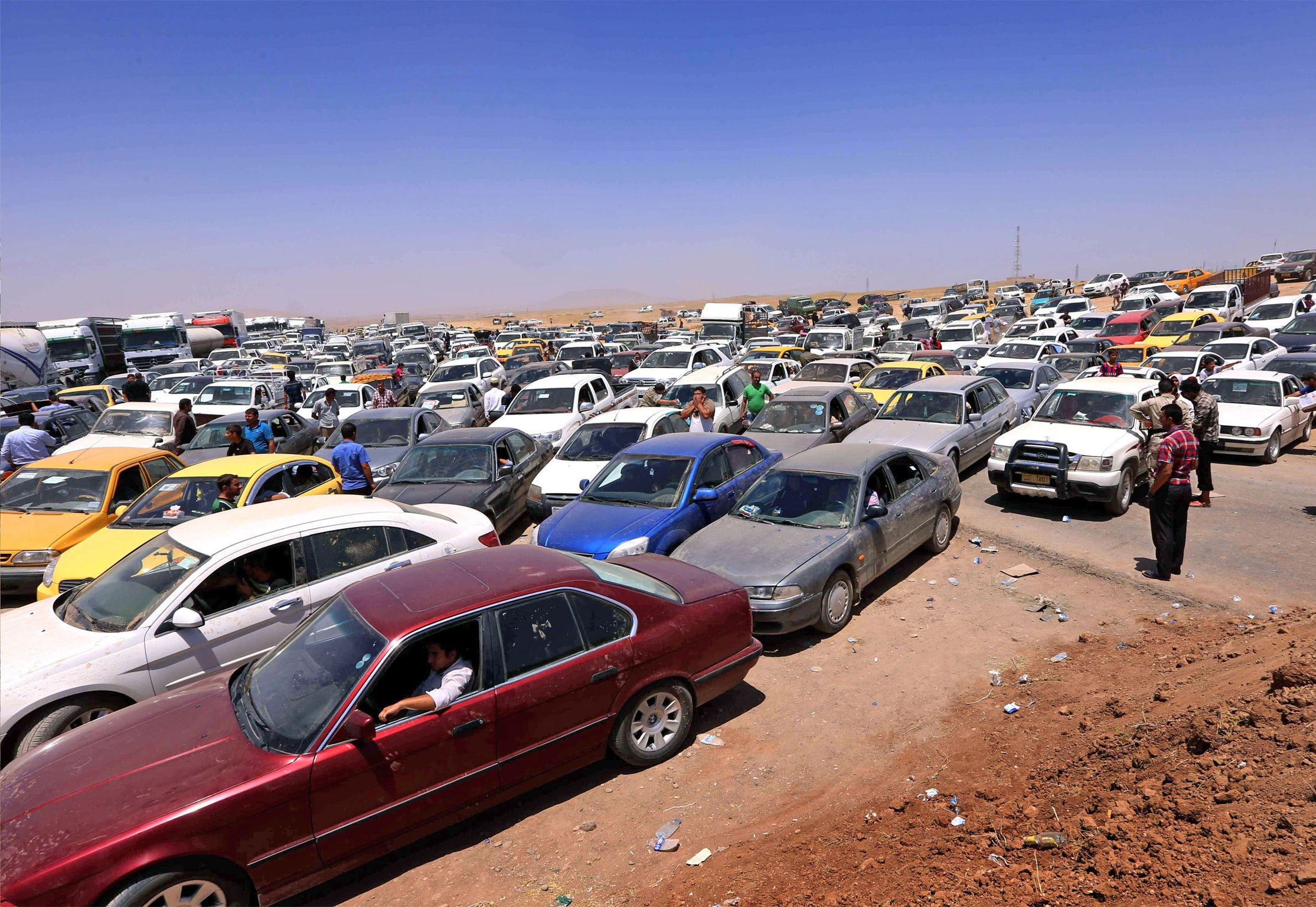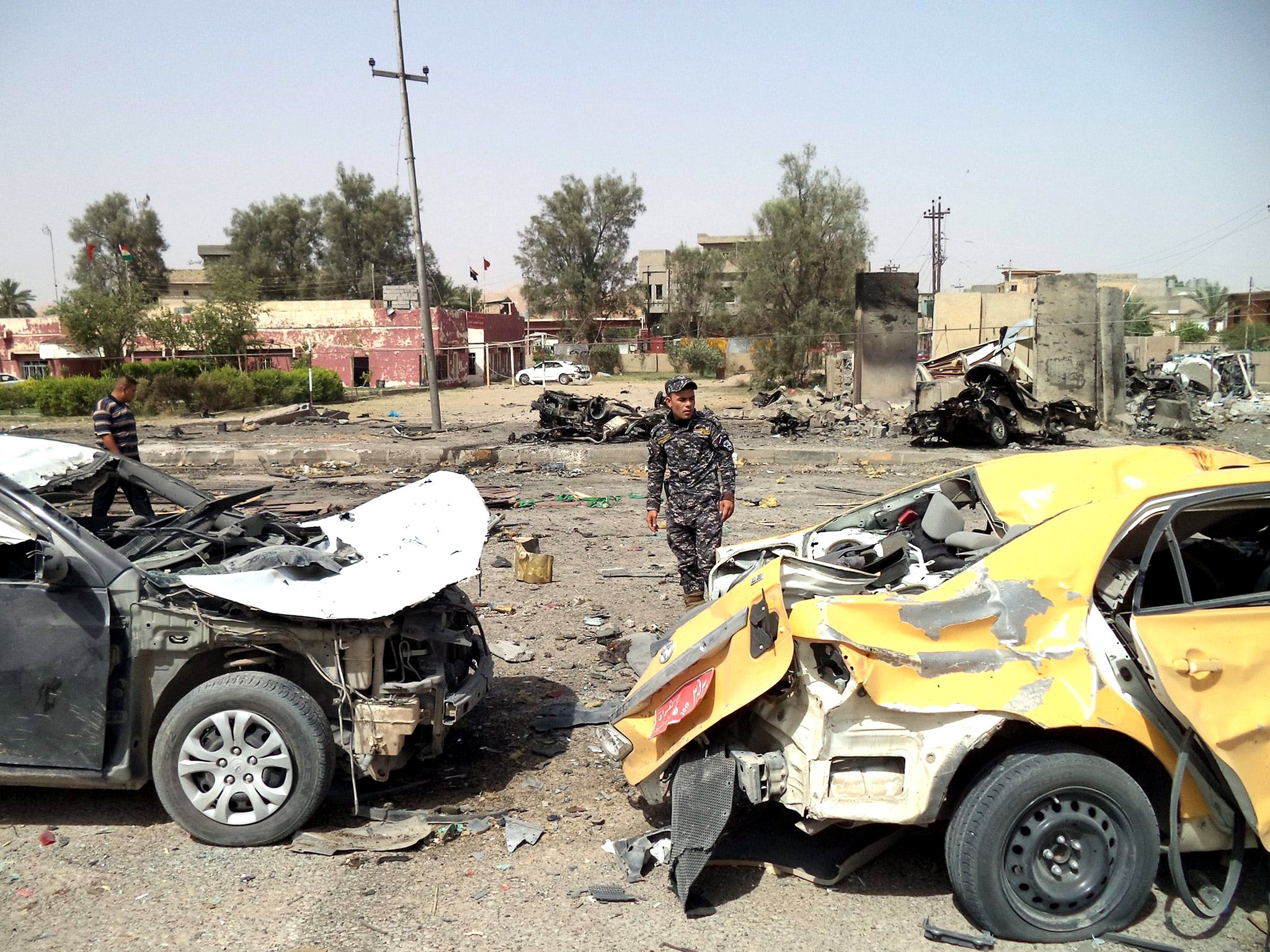Mosul emergency: Anarchy in Iraq as militants seize northern capital and free 1,200 prisoners in jail break
Refugees pour out of the country’s northern capital after it was captured by a terrorist group considered more extreme than al-Qa’ida. Will the West have to intervene again?
Islamic militants have captured Iraq’s northern capital, Mosul, in a devastating defeat for the Iraqi government, whose forces fled the city discarding weapons and uniforms.
The victory by the Islamic State of Iraq and Syria (Isis) is likely to transform the politics of the Middle East as foreign powers realise that an al-Qa’ida-type group has gained control over a large part of northern Iraq and northern Syria. The US said it supported a “strong, co-ordinated response to push back against this aggression”.
An Iraqi army colonel admitted: “We have lost Mosul this morning. Army and police forces left their positions and Isis terrorists are in full control. It’s a total collapse of the security forces.”
As well as police stations, army bases and the airport, the insurgents have captured two prisons and freed 1,200 prisoners, many of them Isis fighters. Roads out of Mosul are choked with refugees heading for what they hope is safety in Kurdish-held territory.
A university lecturer from a well-known family in Mosul told The Independent: “Mosul has fallen completely into the hands of the terrorists. Everyone is fleeing. It’s after midnight here. We are also packing up to leave home, but we have no idea where to go.”
In Baghdad the Prime Minister, Nouri al-Maliki, has asked parliament to declare a state of emergency and called on the international community to support Iraq in its fight against “terrorism”.
But in the streets of the capital, where the population is mostly Shia, there is growing panic and fear that Isis forces may take the Sunni city of Tikrit, which they are approaching, and then move on to Baghdad.
One woman in Baghdad, who did not want to give her name, said: “People are buying up food and may not come to work tomorrow because they think the situation is going to get worse.”
She added that her relatives in Mosul who had been living in the western part of the city, which is bisected by the Tigris River, have moved to the eastern side that contains large Kurdish districts and is defended by well-trained and resolute Kurdish Peshmerga troops. She said: “People in Mosul have seen government forces run away so they think the government will use aircraft to bomb Mosul indiscriminately.”
Mosul is a majority Sunni Arab city and traditionally the home of many families that joined the Iraqi army under Saddam Hussein. His defence minister was normally somebody from the area. Ever since the US-led invasion in 2003, control of the city by Baghdad has been unstable. In 2004 it was stormed by Sunni insurgents who captured most of it and held it for three days until they retreated after the US military appealed to the Kurds to send Peshmerga units from Dohuk inside the Kurdistan Regional Government (KRG).

Could this happen again? Many of the refugees fleeing towards the KRG and the Kurdish capital, Arbil, are Sunni Arabs but they are likely to be joined by members of small sects and ethnic groups such as the Yazidis and Shabak, whom Isis might kill.
The Kurds lay claim to large parts of Nineveh province though not to Mosul itself. The Isis success shows that the local Sunni political leadership has little influence since the governor Atheel Nujaifi only narrowly escaped from his provincial headquarters before Isis captured it. His brother Osama, the Speaker of parliament, called on Massoud Barzani, President of the KRG, to send Peshmerga to recapture Mosul from “terrorists”.

What will the Iraqi government do now? It could counter-attack and in theory it has 900,000 soldiers under arms. But the Iraqi army is more of a patronage system to provide jobs rather than a trained military force.
Though Isis took Falluja, 40 miles west of Baghdad, in January the government has shelled it and dropped barrel bombs but has failed to retake it. Soldiers in Anbar province, where much of the fighting has been concentrated, complain that money for their food and fuel is embezzled by officers and many have deserted.
Even so, the failure of the Iraqi armed forces to fight in Mosul is very striking. “We can’t beat them,” one officer told a news agency. “They’re trained in street fighting and we’re not. We need a whole army to drive them out of Mosul. They’re like ghosts; they appear to hit and disappear within seconds.”

Two army officers claim that the security forces were ordered out of the city after the fall of the Ghizlani base which had contained 200 prisoners in a high-security prison. A further 1,000 inmates escaped from a prison called Badush, west of the city. The army and police set fire to fuel dumps and ammunition depots as they retreated, but there is no doubt that the insurgents will have captured large quantities of weapons.
Isis has grown swiftly in strength over the past three years under the leadership of Abu Bakr al-Baghdadi, also known as Abu Dua, who took over in 2010 after its previous commanders were killed. It has since become highly organised and controlled from the centre, but without becoming less merciless and fanatical. Its propaganda films frequently show non-Sunni Muslims being executed and its reputation for savagery may have helped demoralise the Iraqi security forces in Mosul.
The resurgence of Isis is also explained by the Iraqi Sunni, some five or six million, being emboldened by the revolt of the Sunni in Syria in 2011. Peaceful protests mutated into armed action. The Sunni uprisings in Iraq and Syria have combined into one crisis.
Join our commenting forum
Join thought-provoking conversations, follow other Independent readers and see their replies
0Comments